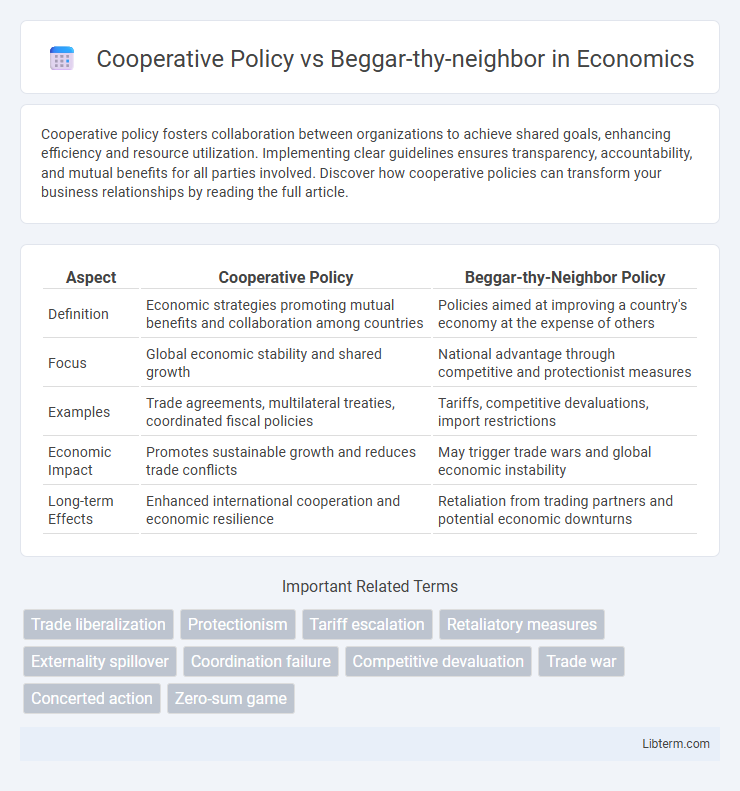Cooperative policy fosters collaboration between organizations to achieve shared goals, enhancing efficiency and resource utilization. Implementing clear guidelines ensures transparency, accountability, and mutual benefits for all parties involved. Discover how cooperative policies can transform your business relationships by reading the full article.
Table of Comparison
| Aspect | Cooperative Policy | Beggar-thy-Neighbor Policy |
|---|---|---|
| Definition | Economic strategies promoting mutual benefits and collaboration among countries | Policies aimed at improving a country's economy at the expense of others |
| Focus | Global economic stability and shared growth | National advantage through competitive and protectionist measures |
| Examples | Trade agreements, multilateral treaties, coordinated fiscal policies | Tariffs, competitive devaluations, import restrictions |
| Economic Impact | Promotes sustainable growth and reduces trade conflicts | May trigger trade wars and global economic instability |
| Long-term Effects | Enhanced international cooperation and economic resilience | Retaliation from trading partners and potential economic downturns |
Introduction to Cooperative Policy and Beggar-thy-neighbor Approaches
Cooperative policy emphasizes collaborative economic strategies where countries work together to achieve mutual growth, reduce trade barriers, and stabilize global markets. In contrast, beggar-thy-neighbor policies involve protectionist measures that aim to improve a country's economic position at the expense of others, often through tariffs or competitive devaluations. Understanding these approaches highlights the impact of international cooperation versus competitive isolation on global economic stability.
Defining Cooperative Economic Policies
Cooperative economic policies emphasize mutual benefits through collaboration, aiming for shared growth and stability among nations by fostering trade agreements, harmonizing regulations, and supporting sustainable development. These policies contrast starkly with beggar-thy-neighbor strategies, which prioritize national advantage at the expense of other countries, often through protectionist tariffs and competitive currency devaluation. Defining cooperative economic policies involves understanding mechanisms that promote global economic integration, reduce trade barriers, and encourage policy coordination to avoid negative spillover effects and economic conflicts.
Understanding Beggar-thy-neighbor Strategies
Beggar-thy-neighbor strategies involve policies that a country implements to improve its own economic conditions at the expense of other nations, often through competitive devaluations, tariffs, and trade barriers. These policies can provoke retaliatory measures, leading to trade wars that undermine global economic stability and reduce overall welfare. Understanding the negative externalities of beggar-thy-neighbor strategies highlights the importance of cooperative policies that promote mutual gains and sustainable international trade relations.
Historical Context and Evolution
Cooperative policy emerged as a strategic approach during the post-World War II era, emphasizing mutual economic support and multilateral agreements such as the Bretton Woods System to stabilize international markets. In contrast, beggar-thy-neighbor policies were prevalent during the Great Depression, where countries imposed tariffs and competitive devaluations to protect domestic industries at the expense of global trade. The evolution of global economic governance shifted towards cooperation with institutions like the IMF and World Bank promoting policy coordination to prevent the detrimental effects of protectionism.
Key Differences Between Cooperative and Beggar-thy-neighbor Policies
Cooperative policies prioritize mutual economic growth by promoting trade agreements and joint fiscal strategies, whereas beggar-thy-neighbor policies focus on boosting domestic economies at the expense of other countries through protectionist measures. Cooperative approaches encourage global stability and long-term benefits, while beggar-thy-neighbor tactics often lead to trade wars and economic retaliation. Key differences lie in their impact on international relations, with cooperation fostering collaboration and beggar-thy-neighbor causing conflict and reduced global welfare.
Economic Impacts on Domestic and Global Markets
Cooperative policy fosters international collaboration, stabilizing domestic economies by encouraging fair trade practices and reducing market volatility. In contrast, beggar-thy-neighbor strategies, such as competitive devaluations or tariffs, often trigger retaliatory measures, disrupting global supply chains and depressing economic growth worldwide. These protectionist actions can lead to decreased aggregate demand and heightened uncertainty in both domestic and international markets, undermining long-term prosperity.
Case Studies: Successes and Failures
Case studies reveal cooperative trade policies, such as the European Union's single market, have led to sustained economic growth and reduced tariffs, benefiting member states through increased trade openness and investment flows. In contrast, beggar-thy-neighbor strategies like the Smoot-Hawley Tariff Act of 1930 triggered retaliatory tariffs that exacerbated the Great Depression, highlighting the risks of protectionism. Successes stem from multilateral agreements fostering collaboration, while failures often arise from isolationist policies provoking trade wars and global economic contraction.
Policy Coordination Among Nations
Cooperative policy emphasizes multinational collaboration to achieve shared economic growth, leveraging policy coordination among nations to prevent competitive disadvantages. Beggar-thy-neighbor strategies, by contrast, involve unilateral actions like currency devaluation or tariffs intended to boost one country's economy at the expense of others, often leading to retaliatory measures and trade wars. Effective policy coordination minimizes global economic volatility and promotes sustainable development by aligning fiscal and monetary policies across countries.
Long-term Consequences for Global Stability
Cooperative policy fosters economic interdependence and trust among nations, leading to sustained global stability and reduced risk of conflict by promoting mutual growth and shared benefits. In contrast, beggar-thy-neighbor strategies, such as currency devaluations and trade barriers, provoke retaliatory measures that destabilize international markets and escalate tensions. Long-term reliance on cooperative frameworks like multilateral agreements and coordinated fiscal policies enhances resilience against global crises, whereas beggar-thy-neighbor tactics erode trust and amplify volatility in the international economic system.
Future Trends and Policy Recommendations
Future trends in economic strategy indicate a growing preference for cooperative policy frameworks that emphasize multilateral agreements, resource-sharing, and sustainable development to counteract the negative impacts of beggar-thy-neighbor tactics such as trade wars and protective tariffs. Policy recommendations encourage the adoption of international collaboration platforms, investment in joint innovation initiatives, and the reinforcement of global trade institutions to foster stability and equitable growth. Emphasizing transparency, mutual benefit, and long-term strategic planning can mitigate the risks associated with zero-sum economic behaviors, promoting resilient global supply chains and inclusive prosperity.
Cooperative Policy Infographic

 libterm.com
libterm.com